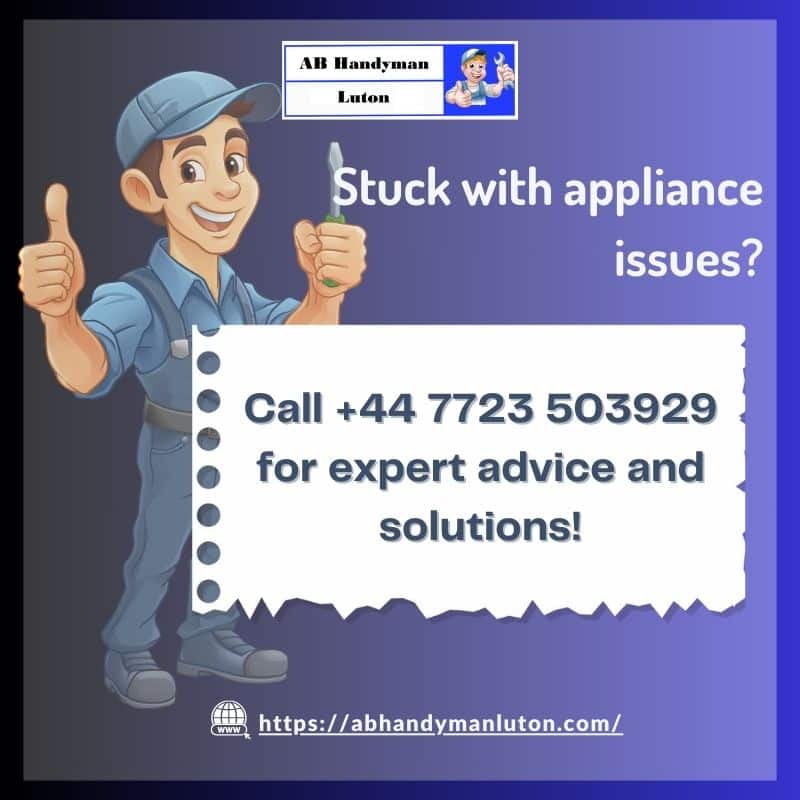How do I troubleshoot common appliance issues before calling a handyman for repair?
When your appliances in Luton start acting up, it can cause immediate disruptions to your daily routine. Here’s a guide brought to you by Luton Handyman, detailing common appliance problems, their signs, and potential solutions to help you diagnose and fix issues promptly.

Mastering the Art of Home Appliance Repairs: Helpful Tips
Achieving mastery in home appliance repairs requires a strategic approach and a set of helpful tips. Begin by familiarizing yourself with the user manuals of your appliances, as they often contain valuable troubleshooting guidance. Embrace a systematic troubleshooting method, identifying and addressing issues step by step. Acquire basic tools and equipment to facilitate common repairs and maintenance tasks. Practice caution by ensuring appliances are unplugged before inspection. Explore online resources, tutorials, and communities dedicated to home appliance repairs to enhance your knowledge and problem-solving skills. Regular practice and a commitment to safety will contribute to your proficiency in mastering the art of home appliance repairs.
REFRIGERATOR ISSUES
Fridge not cooling properly:
If your refrigerator is not cooling efficiently, dirty condenser coils might be the culprit. These coils, responsible for dissipating heat, can accumulate debris, affecting cooling. Cleaning the coils is a first step; if the issue persists, consult a professional for potential fan replacement.
Leaking water:
A leaking fridge may signal a clogged or frozen defrost drain. Overflowing water can lead to floor damage. Check and clear the drain; if leaks persist, contact a professional for a thorough assessment.
STOVE AND OVEN ISSUES
Electric Stove not heating:
For a non-heating burner, it could be a faulty heating coil or connection. Swap coils and rewire connections for troubleshooting. If issues persist across all burners, check power connections, outlets, and fuses. Internal wiring problems may require professional attention.
Gas stove will not light:
A gas stove not lighting may be due to a defective ignition switch or gas flow issues. Ensure the stove emits a clicking sound and a gas smell. If not, replace the ignition switch or inspect the gas connection internally.
Electric Stove not adjusting heat properly:
Issues with heat adjustment may indicate a broken or malfunctioning Infinite Switch, responsible for variable power output. Professional replacement or repair may be necessary.
DISHWASHER ISSUES
Washer making strange noises:
Unusual dishwasher noise could result from improper dish stacking or a defective pump. Rearrange dishes; if noise persists, consider pump replacement.
Washer not filling or overfills:
Issues with water filling may involve a blocked inlet valve or float switch problems. Check and replace the inlet valve; inspect the float switch for proper functioning.
Washer does not start:
Check plugs, fuses, and the circuit breaker before panicking about a non-starting washer. Blockages in the door latch or electronic control issues may require professional attention.

WASHING MACHINE ISSUES
Washing Machine will not drain:
Standing water after a cycle may indicate a blocked drain pump. Remove debris or consider pump replacement.
Washer refuses to spin:
Troubleshoot by inspecting the lid switch assembly and belt drive. Test and replace the lid switch, tighten or replace the belt as needed.
Washer is leaking water:
Leaks may result from a cracked drain pump or torn tub seal. Replacement of the pump, tub seal, and bearings may be required, necessitating professional assistance.
DRYER ISSUES
No heating during the drying cycle:
Wet clothes post-drying may signal a bad thermal fuse. Replace the thermal fuse after accessing the back panel.
Dryer does not work at all:
Check power sources, outlets, and the terminal block. A malfunctioning terminal block may require professional replacement.
MICROWAVE ISSUES
Microwave does not heat:
Commonly caused by magnetron failure, this issue requires prompt replacement. Other causes may include capacitor burn or faulty diodes. Consult a technician for a comprehensive diagnosis.
Microwave runs but stops:
Issues with door switches or transformers may need electrical work or parts replacement, requiring professional intervention.
Plate doesn’t spin, causing uneven cooking:
Potential causes include a burned-out motor or main control board issues. Microwave complexities warrant professional diagnosis and resolution. Contact a technician for accurate assessment.
Conclusion
In conclusion, mastering the art of home appliance repairs is an achievable goal with a combination of knowledge, practice, and a safety-first mindset. By incorporating helpful tips such as consulting manuals, adopting a systematic troubleshooting approach, and acquiring the necessary tools, individuals can enhance their repair skills. Continuous learning through online resources and community engagement also plays a vital role. Ultimately, a diligent and cautious approach ensures not only effective repairs but also contributes to a safer and more confident handling of home appliances.
- How do I troubleshoot common appliance issues before calling a handyman for repair? - January 12, 2024
- Plumbing Woes? DIY Fixes and Pro Tips to Keep Your Home Flowing Smoothly - January 12, 2024
- DIY Guide: Fixing a Leaky Roof on Your Own - January 12, 2024
